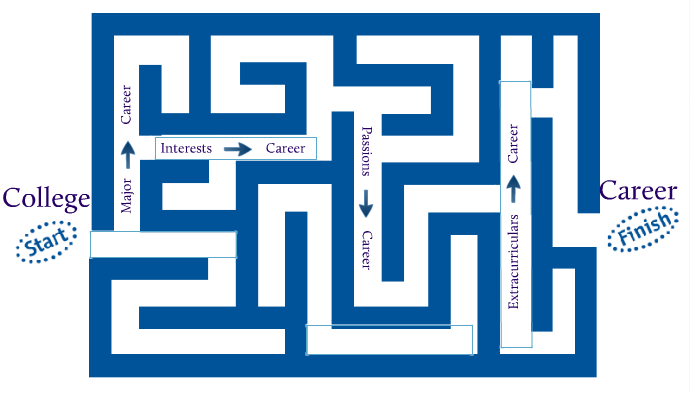Mapping majors to careers
As the coordinator of freshmen and sophomore initiatives for our office, I meet with underclassmen nearly every day. The number one concern of most freshmen and sophomores I meet is choosing the “right” major. I met with two students this week, both faced with deciding what to study. How to pick a “good” major, how to pick the “right” major, how to pick the “best” major- no matter how you phrase it, the question is the same. You want to study something that will benefit you when you leave college, but what?
There are times where careers or industries do require you to pick the “right” major. If you dream of being a software developer, you’ll need the right computer skills and a Computer Science major can help you get there. Perhaps you dream of being a college history professor- you can bet that majoring in history to prepare for graduate school will be beneficial.
But for the rest of us, majors are a sticky issue because more often then not, they are not linearly aligned with career choices. One of the students I met with this week asked me what my major was in college. “Journalism,” I told him, and waited for the inevitable jaw drop or confused facial expression. I got it. But I told the student, as I’ll tell you, that choosing to be a journalism major gave me a skill set that I use every single day in my job. I know how to take a complex issue and write about it effectively. I developed interpersonal skills through lots of interviews and conversations with the subjects of my stories. I learned how to respond productively to criticism from editors and apply it to better my work. I developed confidence, learned to navigate deadline pressure and manage stressful situations. In sum, my major prepared me well for my career.
I was a journalism major, yes, but I am not a journalist. For me, major did not equal career and that is totally okay because I know the ways in which that major was beneficial for me. What I challenge you to do as you think about major choices is to re-frame the question you’re asking. Don’t ask what the major can do for you in the job search. Ask yourself what skill sets the majors you are considering will help you to develop and learn to clearly articulate them. Ask yourself every day what you are learning and why it matters. Because in the interview or on the graduate school application, you have to convince others that you’ve got the skills they need. And whether you got those skills from a psychology major or an econ major may matter less than your ability to articulate what you’ve learned, how it applies to your goals, and what you have to offer.
Parents, alumni and other readers, I invite you to share in the comments your experiences with how you link your major (or not) with the work you do.
Comments are currently closed. Comments are closed on all posts older than one year, and for those in our archive.





I majored in German, convinced that I wanted to work in Germany or Austria after college. Unfortunately, it never really occurred to me that being proficient in German was — by itself — a pretty weak qualification for a job in a country where nearly everyone would speak German natively (and English almost as well). Perhaps if I’d been talking to someone like Ashleigh from the beginning of my college career, I would have planned differently. 🙂
Be that as it may, my German major (and my liberal arts education generally) helped me to develop skills and habits of mind that have allowed me to succeed as an educational administrator. It taught me to look at issues from multiple perspectives and to remember that everyone sees the world through their own unique lens. Learning other languages developed mental flexibility and also gave me an even better understanding of the rules of English, which helped me to become a better writer. Making a fool of myself as I tried to express thoughts beyond my linguistic abilities taught me humility and the value of patience. It also made me want to be more patient with others. Those are all things I draw upon every day.
I majored in Physics, something that often gets a bit of a gasp when people hear it. I’ll admit it was challenging, but not overly so; science had always been my passion and I truly enjoyed the experience (ok, the math maybe not so much, but still).
However, around the end of my junior year, I realized that I would very unlikely be following a career in Physics (see aforementioned comment on the math). But, I was not terribly worried about that. The liberal arts education I was getting made for great preparations. I decided that I would take my other passion (computers) and run with that. I took a few CS courses my last year (although I had been programming since I was 5, so, I don’t know how much good they did me).
I was able to find a job as a software developer right after I graduated. 14 years later and I am the Director of Software Implementation at my company. A few years back I decided to go back and get my Masters in CS just to round out my degrees (and for fun if I’m being honest).
What I tell people is that your specific degree rarely matters, when I look to hire people, I want smart, curious, and engaged people. If you meet that bar, you are golden.
-Jeremy
I ended up graduating with a major in Government and a minor in Anthropology, but I took advantage of my time in college to explore my interests. I spent one summer working on an NSF-funded research project in the Government Department and another summer interning at GWU’s Anthropology Department. The two experiences were enough to help me decide that while I was interested in Anthropology going into academic wasn’t for me. Before that summer experience I had planned on graduating with an Anthropology major. I switched my course plans around and focused on Government.
During college I dabbled in other departments. I took some classes in the Environmental Science/Studies program, I almost completed an Economics minor, and I even explored some Classics courses. I work in a field related to my major, I am a research analyst at a major national campaign committee, but I’ve found that my non-Government courses did more to develop my skills than my Government major itself. I have to grasp often complex and random issues and find ways to summarize them for laymen.
I don’t think there’s only one specific degree for any given career pathway. I do think that some degrees would ill-equip you for certain pathways, but there’s a lot of flexibility.
I graduated with a double major in Religion and History. As the first person in my family to go to college and VERY limited finances, I struggled mightily for many years after graduating. If you don’t have significant resources to invest in the years immediately after college, then I suggest keeping one foot solidly in reality and prepare for that first job while in school. Don’t be afraid to explore interests and learn about yourself and the world, but be sure to prepare for those first few years. I eventually got my masters and have a great career now, but those first few years were very challenging to say the least. Best wishes on picking your major.
I declared my major at the last possible second sophomore year. I took classes in every department I could, trying to satisfy GERs and trying to find out what would best suit me. I really enjoyed and was interested in the History classes I took with my advisor, and finally declared a History major. Meanwhile, I was singing in an a cappella group, doing musicals, and taking music classes, since that was one of my passions. I didn’t declare a major in Music because I didn’t think it was a ‘viable’ major for the real world, even though I didn’t know what I wanted to do after college.
My last semester, my best friend and I were talking about what we wanted to do, and she suggested that I just go into music, since I did so much of it already and loved it so much. I was only eligible to apply to one school, due to the fact that I did not have an undergraduate degree in music. However, the school was impressed by my alma mater, as well as the writing examples I provided. My degree prepared me to think and write critically, and it has since helped me connect concepts in my job as an elementary music teacher. Although the two disciplines are only vaguely related, they have shown to be very complementary. It soon became evident to me that it wasn’t just what I learned at William and Mary, but how I learned to learn.
I am the W&M undergrad to law school stereotype – I majored in government, worked for a few years, and then went to law school. It prepared me well for what I’ve done so far.
However, I want to tell you that you don’t have to go that route! If you’re thinking about going to law school, help yourself stand out by not majoring in government/political science. Law school will teach you what it needs you to know – use the time before to acquire writing and logic skills. And if you’re worried about what law school you’ll get into (which we all are), then consider doing something novel with your education. I am most impressed with people who created their own major from various interests they have.
Good luck!
I was an Environmental Science major, and the first jobs I had were in that sector. Then the Internet happened. Now, I work in a job that did not exist when I graduated. As Richard said above: it is good to plan for some sort of “starter job” for immediately after graduation. But – the main strength of a William and Mary graduate is intellectual resilience and flexibility. Because you never know what life and a rapidly evolving job market will throw at you.
As someone who isn’t a journalism major but works for JMU’s college newspaper, I can clearly understand your point. The idea of putting something into words for the common person to understand is invaluable for anyone looking to go into a writing field (as well as numerous other fields). That’s something I’ve learned in the last few years since I started writing and editing articles. I’m currently a Media Arts & Design major focused on film production and cinema studies, but what I want to do is write. For me, SMAD has been a great way to do that because I’m forced to be a creative on a number of different levels–in print media, digital, and web production. I’ve been exposed to all different Adobe software and have a conglomeration of skills that I hope will help when I graduate in May and need to start my search.
I am a student going into my sophomore year this fall. I’ve been worried since I entered college about which major to choose, how to decide upon that major, and then what to do with that major!
Talking with Ashleigh as often as I did this past year has taught me that there is really no direct path or “right way” to go about doing any of this. I’m currently trying to look up various internships so that I can get my feet wet in a variety of potential career fields and hopefully make this upcoming decision easier on myself!
It is very reassuring to read about everybody’s majors and how they ended up relating to careers later on. If the thousands of other successful college graduates can do it, then there may be hope for me yet!